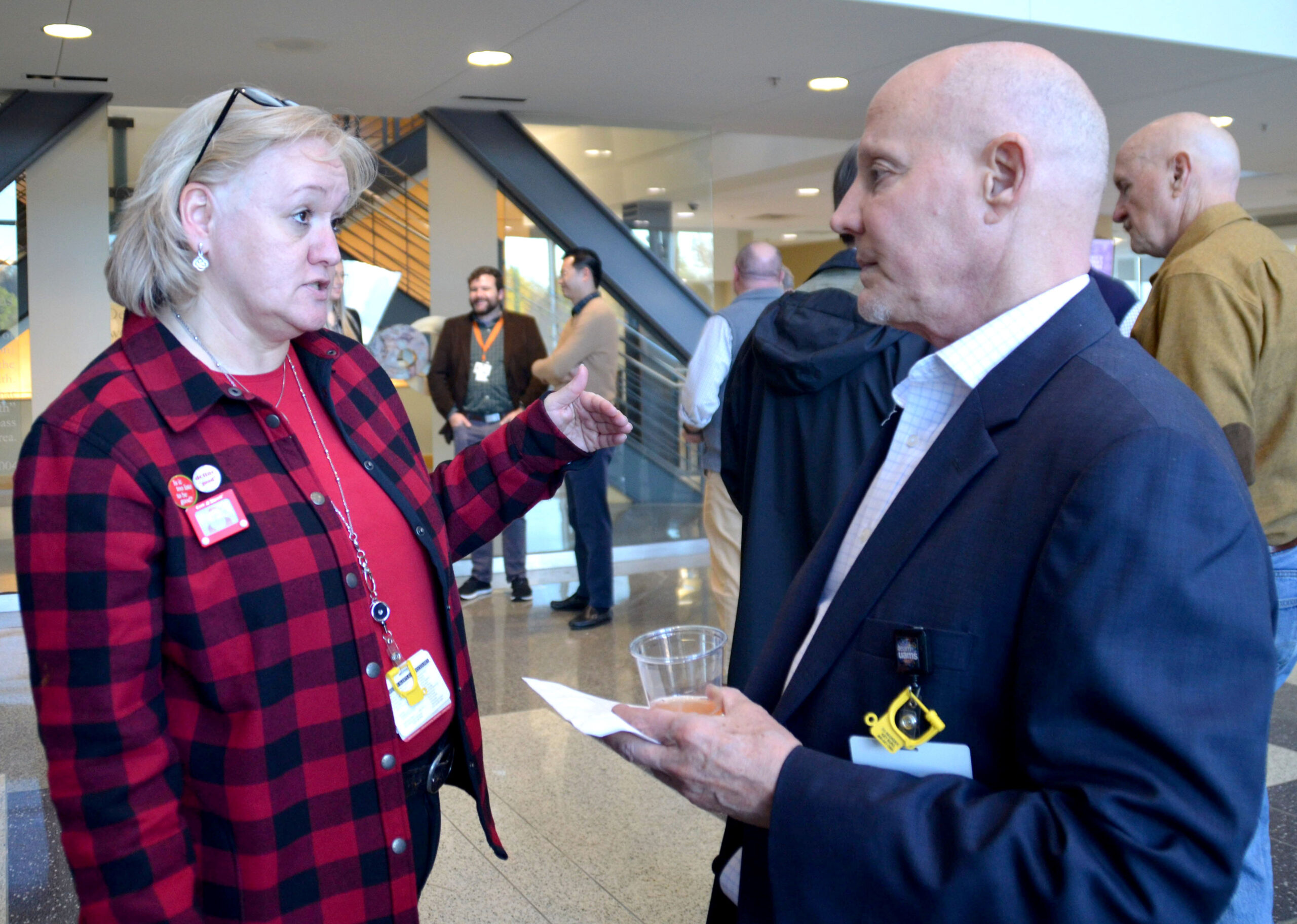UAMS College of Public Health Plays Key Role in Helping Vaccinate Arkansans
| The University of Arkansas for Medical Sciences (UAMS) Fay W. Boozman College of Public Health played a key role in an initiative to help increase the COVID-19 vaccination rate in Arkansas counties where the percentage of residents vaccinated is below 50%.
The Vaccine REACH (Reaching Everyone to Achieve Community Health) Program is funded by a $9.8 million grant from the Health Resources & Services Administration and is led by the UAMS Office of Community Health & Research.
Dean Mark Williams, Ph.D., and Cynthia Lewis, MSPH, associate professor and director of the Office of Professional Development and Program Evaluation, are the college’s representatives in the coalition.
“We’re involved in the portion of the grant related to marketing the campaign,” said Lewis. “We have a lot of programs and researchers doing COVID-related work throughout the state. Therefore, we’re especially familiar with the counties and areas that greatly need access to this initiative. This is an important partnership. It’s a collaborative effort between UAMS team members in Northwest Arkansas and those of us in Central Arkansas.”
Krista Langston, executive director of programs for the Office of Community Health & Research, said the college also fills a key role in creating culturally appropriate methods to reaching Arkansans of all backgrounds.
“The College of Public Health works with stakeholders from diverse sectors to develop culturally-effective strategies for outreach and education,” she said. “The college assists with these efforts while also monitoring the data and trends related to vaccination rates, vaccine hesitancy and equitable access. That’s all important — as their efforts ensure that the project is focused on the areas where it’s needed most.”
Currently, only 25 of Arkansas’ 75 counties have more than 50% of the population vaccinated. The counties with the lowest rates are in Arkansas’ South, Southwest and Delta regions.
This project launched in April 2022. The college’s marketing campaign, which focused on adult African Americans in the aforementioned areas, began in August 2022 and continued through October. The college’s campaign included print, digital, social media and television content.
A common issue for people who refuse to take the vaccine is overall trust in the product and the lack of knowledge as to the long-term effects of the vaccine. To help overcome those barriers, in addition to the college’s marketing campaign, the program will use the assistance of community health workers, who live in the communities where the vaccination rates are low. The workers will present accurate info about the COVID-19 vaccines. Each community health worker receives special training to assure that they’re properly informed and are cognizant of recent trends.
Also, the coalition is attending community events in the select areas to give people both access to correct vaccine info and a better possibility of getting vaccinated. Local pharmacies are promoting correct info about vaccines as well. However, having the community health workers connecting with their fellow townspeople is perhaps most vital to the program’s success.
“We’re hiring individuals who the community is already familiar with and equipping them with accurate information on vaccines,” said Stephanie Kruger, associate director of of Community Programs in the Office of Community Health & Research. “The hope is that the community health workers would become trusted influential messengers. Thereby, they’re educating their community about COVID-19 vaccinations and helping to increase acceptance of the vaccine.”
Enhancing knowledge of the vaccine is something that the college has done since the first shots were approved.
“As the state’s only college of public health, we need to be at the forefront of educating Arkansans on the facts about the vaccines and assisting in getting the vaccines to people who haven’t had a previous opportunity to receive them or have previously declined,” Lewis said.
Arkansas’ first confirmed COVID-19 case was in March 2020. From that moment, a multitude of college faculty, staff, alumni — and even students — have contributed to programs and research that address the state’s vaccination rates.
Despite those efforts, vaccination rates still vary widely among racial groups.
As of January 2023, Arkansas’ COVID-19 vaccination reports by race showed the following rates: white, 70.5%; Black, 13.1%; Asian, 1.9%; other race 7.7%, this includes Hispanics at 7.3%; and unknown race at 6.4%.
As part of the college’s marketing campaign, informational emails were produced for the general public. Commercials aired on broadcast and streaming platforms. More than 41,000 Arkansans responded to the digital messaging, and 10 newspapers in the emphasized areas ran ads promoting the vaccine hesitancy program.
Through this partnership, the college, which also produced numerous statewide COVID-19 reports, added another dimension to its COVID-19 awareness efforts.
“Getting vaccinated is something that we can all encourage our family and friends to do,” Lewis said. “Also, we can all remind people to stay home if they don’t feel well. Wear a mask when inside and when around those not in your family. Getting boosted is as important as getting the initial doses of the vaccine. The science will continue to expand. As it does, everyone should stay educated on the changes both in the virus and the vaccines that are available.”
The college having a major role in this coalition is ideal, Lewis added.
“Due to this grant focusing on COVID-19 it’s a great connection to the college’s work during the height of the pandemic in forecasting how the virus was spreading,” she said. “On this side of the pandemic, we can now focus on prevention. Having the college help lead the campaign showcases our focus on public health as prevention and not just as a response to a pandemic.”
